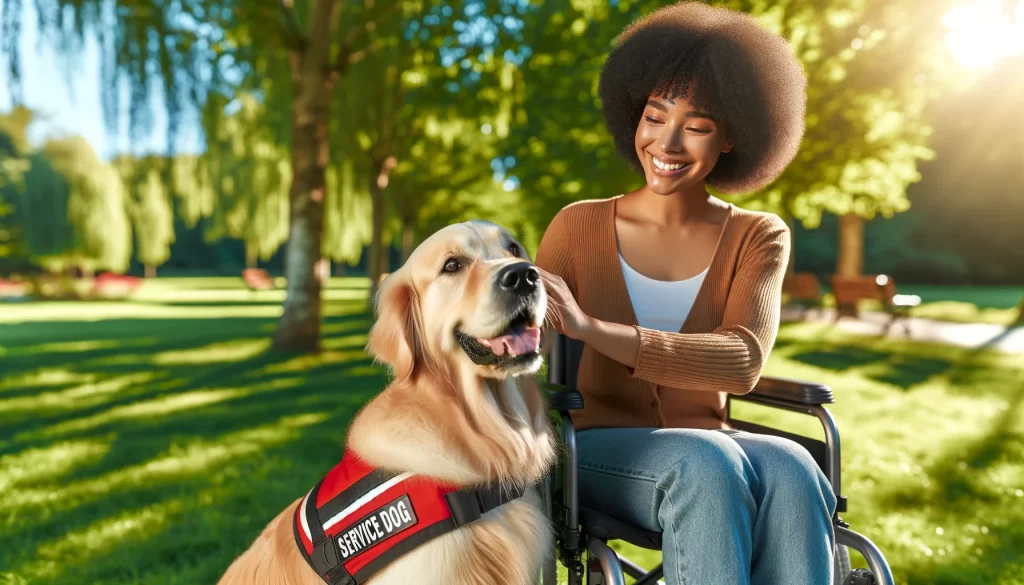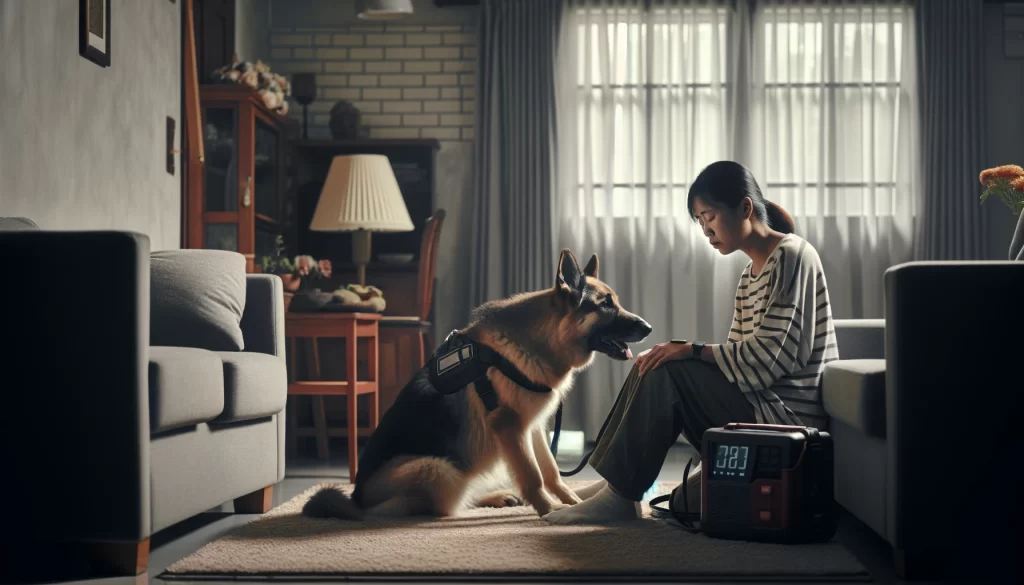Can You Get A Service Dog For Lupus?
 January 2, 2024 | Lupus
January 2, 2024 | Lupus
Can You Get A Service Dog For Lupus?
Living with lupus can be challenging, both physically and emotionally. However, for individuals diagnosed with lupus, a service dog can provide invaluable assistance in managing symptoms and enhancing their quality of life. Service therapy dogs are specifically trained to assist people with disabilities, offering physical assistance and emotional support. In this article, we will explore the benefits of service animals for lupus patients and discuss the eligibility criteria for obtaining one.

Key Takeaways:
- Service animals can provide physical assistance and emotional support to individuals with lupus.
- Physical assistance tasks include retrieving items, opening doors, and alerting for flare-ups.
- Support dogs offer constant companionship and help reduce stress and anxiety.
- They can encourage regular exercise and provide a sense of routine and structure.
- Alert dogs enhance safety and security, responding to emergencies if needed.
Table of Contents
- Can You Get A Service Dog For Lupus?
- Physical Assistance Provided by Service Dogs for Lupus Patients
- Emotional Support Offered by Service Dogs for Lupus Patients
- Encouraging Routine and Exercise with Service Dogs for Lupus Patients
- Safety and Security Provided by Service Dogs for Lupus Patients
- Eligibility for a Service Dog for Lupus Patients
- Conclusion
- FAQ
Physical Assistance Provided by Service Dogs for Lupus Patients
Service animals play a crucial role in providing physical assistance to individuals with lupus. They are trained to perform various tasks that help people with disabilities regain their mobility and independence. These tasks include:
- Retrieving dropped items: Support animals are trained to pick up objects that their handlers may have difficulty reaching due to mobility limitations caused by lupus.
- Opening doors: For individuals with limited hand mobility or strength, assistance dogs can be trained to open doors and facilitate easy access.
- Assisting with balance and stability: Lupus patients often experience joint pain and fatigue, making it challenging to maintain balance while walking. Service canines are trained to provide support and stability, reducing the risk of falls.
- Alerting for flare-ups and changes: Service dogs can detect subtle changes in their handlers’ physical condition, such as increased body temperature or heart rate, signaling the onset of a lupus flare-up. This early warning allows individuals to take appropriate measures to manage their symptoms effectively.
- Medication reminders and retrieval: Service dogs can be trained to remind their handlers to take medication at specific times and even retrieve medication from a designated location, ensuring timely and consistent management of lupus medications.
By performing these physical assistance tasks, service assistance dogs empower individuals with lupus to navigate their daily lives with greater ease and confidence, promoting functionality and improved quality of life.
Real-Life Benefits of Physical Assistance Tasks
Having a service dog as a lupus patient has been life-changing. My labrador retriever helps me with tasks like opening doors and picking up items, saving me from unnecessary pain and fatigue. He also alerts me when he senses a flare-up coming, giving me the chance to prepare and manage my symptoms effectively. I don’t know how I managed without him.
Here’s a table summarizing the physical assistance tasks provided by service dogs for lupus patients:
| Physical Assistance Task | Description |
|---|---|
| Retrieving dropped items | Helping individuals with limited mobility retrieve objects that are out of reach. |
| Opening doors | Assisting with accessing and entering or exiting buildings or rooms. |
| Assisting with balance and stability | Providing support and stability during walking to prevent falls. |
| Alerting for flare-ups and changes | Detecting physical changes indicating a lupus flare-up to enable proactive symptom management. |
| Medication remindersand retrieval | Assisting with medication schedules and retrieving essential medications. |
Service dogs go above and beyond in their physical assistance, offering much-needed support to individuals with lupus, enabling them to overcome physical limitations and live their lives to the fullest.
Emotional Support Offered by Service Dogs for Lupus Patients
Living with a chronic illness like lupus can have a profound impact on an individual’s emotional well-being. The constant physical symptoms, medical appointments, and lifestyle adjustments can contribute to heightened stress, anxiety, and feelings of isolation. However, emotional support dogs can provide invaluable emotional support for lupus patients, offering a constant companion and a source of comfort.
Service dogs are known for their ability to form deep bonds with their handlers and provide unconditional love and companionship. Their presence alone can have a calming effect and reduce feelings of stress and anxiety. Numerous studies have demonstrated the mental health benefits of having a service dog, including decreased symptoms of depression and improved overall mood.
During challenging moments and medical appointments, service dogs offer a reassuring presence, providing comfort and a sense of security. Their intuitive ability to sense their handler’s emotional state enables them to offer support in times of distress. Whether it’s through a gentle nudge, a comforting paw, or simply providing a listening ear, service dogs can help to alleviate emotional burdens and provide a lifeline of support for individuals with lupus.
“Having my service dog by my side has been a game-changer for my emotional well-being. She offers unwavering support and has brought immense comfort to my life. I can’t imagine going through this journey without her constant companionship.”
Service dogs help to combat feelings of loneliness and isolation that many individuals with lupus may experience. Their presence creates a sense of connection and belonging, as they become an integral part of their handler’s daily life. Service dogs can accompany their handlers on outings, social events, and even provide a source of conversation and interaction with others.
The emotional support provided by service dogs can significantly enhance the mental well-being of individuals living with lupus. Their constant companionship, ability to reduce stress and anxiety, and their role in decreasing feelings of isolation make them an invaluable resource for emotional support.

| Benefits of Emotional Support Provided by Service Dogs for Lupus Patients |
|---|
| Reduces stress and anxiety |
| Decreases symptoms of depression |
| Improves overall mood |
| Offers comfort and reassurance during challenging moments and medical appointments |
| Reduces feelings of loneliness and isolation |
Encouraging Routine and Exercise with Service Dogs for Lupus Patients
Regular exercise is beneficial for individuals with lupus, and service dogs can play a role in motivating their handlers to engage in physical activity. Service dogs not only provide companionship but also encourage their handlers to take daily walks, promoting regular exercise in a fun and enjoyable way.
Alongside promoting physical activity, caring for a service dog can provide structure and routine to a lupus patient’s day. This structured routine can be therapeutic and beneficial for mental health, helping individuals cope with the challenges of living with an autoimmune disease. From feeding and grooming to exercise, the presence of a service dog offers a sense of purpose and responsibility, enhancing overall well-being.
Service dogs are known to have a positive impact on the lifestyles of lupus patients, becoming trusted companions that encourage healthy habits and a more active lifestyle. Their unwavering support and encouragement can make a significant difference in the lives of individuals living with lupus.
Overview of the Benefits of Service Dogs for Lupus Patients
- Encourages regular exercise
- Provides structure and routine
- Offers emotional support
- Promote independence
- Enhances mental well-being
Service dogs provide the unique combination of companionship, encouragement, and structured routines that support individuals with lupus in maintaining an active and fulfilling lifestyle. With their assistance, lupus patients can experience the many benefits of regular exercise and a more structured daily routine.
Safety and Security Provided by Service Dogs for Lupus Patients
Service dogs offer an added layer of safety and security for individuals with lupus. Trained service dogs can be taught to respond to emergencies, such as seizures or falls, by alerting others and expediting necessary assistance. Their presence also boosts confidence and provides a sense of security when venturing out in public, knowing that their canine companion is trained to help and support them.
Service dogs can play a vital role in ensuring the well-being of individuals with lupus, especially in unexpected situations. In emergencies, these skilled animals can quickly assess the situation and take appropriate action, providing a swift and potentially life-saving response to emergencies. Whether it’s alerting a family member or a healthcare professional, or fetching necessary medical supplies, service dogs act as reliable partners in times of crisis.
Service animals have been shown to enhance the overall confidence of lupus patients. The knowledge that their service canine is trained to respond to emergencies and protect them instills a sense of reassurance and tranquility. This enhanced confidence allows individuals with lupus to navigate their daily lives with less anxiety and fear, empowering them to engage in social activities and fulfill their responsibilities with greater peace of mind.

| Benefits of Safety and Security Provided by Service Dogs for Lupus Patients |
|---|
| 1. Fast and reliable response to emergencies |
| 2. Enhanced confidence and peace of mind |
| 3. Ability to navigate daily activities with reduced anxiety |
| 4. Strong sense of security when venturing out in public |
Eligibility for a Service Dog for Lupus Patients
While service animals can provide immense support for individuals with medical conditions like lupus, it’s important to note that not everyone qualifies for a support animal. However, individuals with lupus can still experience the benefits of having an emotional support animal (ESA). ESAs offer comfort, companionship, and are exempt from certain housing restrictions.
To determine eligibility for a support dog or ESA, it is essential to consult a medical professional. They can assess your specific needs and provide a legitimate medical letter recommending the use of a service animal or ESA. This document is crucial for validating your need for an assistance animal.
Having a service dog or ESA can make a significant difference in the lives of individuals with lupus, providing them with the support and companionship they need. Whether it’s a service dog or an emotional support animal, both have the potential to enhance the well-being and quality of life for those living with lupus.
Conclusion
Service animals for lupus can significantly enhance the quality of life for individuals facing this chronic illness. These specially trained dogs offer invaluable physical assistance, emotional support, and the promotion of routine exercise.
However, it’s crucial to consider individual eligibility and consult healthcare providers before pursuing a service dog or emotional support animal. Obtaining a service canine is a major responsibility that requires commitment and dedication.
For those who qualify and are willing to fulfill the necessary requirements, service animals can provide unparalleled support and companionship on the journey of living with lupus, ultimately enhancing the overall well-being and quality of life for individuals with this challenging condition.
FAQ
Can a service dog provide physical assistance for individuals with lupus?
Yes, service canines can be trained to perform tasks such as retrieving dropped items, opening doors, assisting with balance and stability, and alerting for flare-ups and changes in the handler’s condition.
How can a service dog offer emotional support to individuals with lupus?
Support dogs provide constant companionship, offering unconditional love and reducing anxiety and depression. They offer comfort during challenging moments and medical appointments, helping combat feelings of loneliness and isolation.
Do all individuals with lupus qualify for a service dog?
Not everyone with lupus qualifies for a support animal. However, even if not eligible for a service animal, individuals with lupus can still benefit from an emotional support animal (ESA).
How can someone determine their eligibility for a service dog or emotional support animal?
To determine eligibility, a medical professional should be consulted, and a legitimate medical letter recommending the use of a service dog or ESA should be obtained.

Hi there. I’m Angela…and I live daily with chronic illness. For the longest time, I suffered in silence for fear of being judged or criticized. When I finally started opening up, I realized that I’m not alone in all of this and if you have a chronic illness, neither are you!
ABOUT

Hey there! I'm Angela,
I am a survivor of cancer, lupus, fibromyalgia, and a teenage daughter. Join me as I document my experiences and educate the world on my chronic illness journey.


